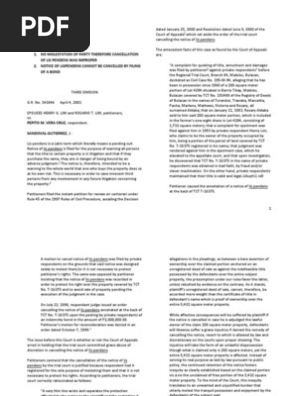0% found this document useful (0 votes)
24 views4 pagesResearch On Notice of Lis Pendens
The report assesses whether Hector E. Fajardo's application for a notice of lis pendens should be granted regarding a criminal estafa case involving a parcel of land. It concludes that the application is not proper as the estafa case does not affect the title or possession of the property, and Fajardo does not assert ownership or possession rights over it. The report emphasizes that the nature of the estafa case is personal against the accused, not against the property itself.
Uploaded by
Sheena C.Copyright
© © All Rights Reserved
We take content rights seriously. If you suspect this is your content, claim it here.
Available Formats
Download as DOCX, PDF, TXT or read online on Scribd
0% found this document useful (0 votes)
24 views4 pagesResearch On Notice of Lis Pendens
The report assesses whether Hector E. Fajardo's application for a notice of lis pendens should be granted regarding a criminal estafa case involving a parcel of land. It concludes that the application is not proper as the estafa case does not affect the title or possession of the property, and Fajardo does not assert ownership or possession rights over it. The report emphasizes that the nature of the estafa case is personal against the accused, not against the property itself.
Uploaded by
Sheena C.Copyright
© © All Rights Reserved
We take content rights seriously. If you suspect this is your content, claim it here.
Available Formats
Download as DOCX, PDF, TXT or read online on Scribd
/ 4





























































































